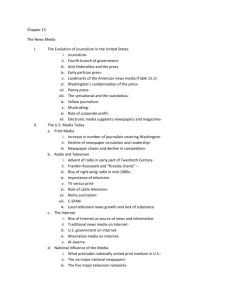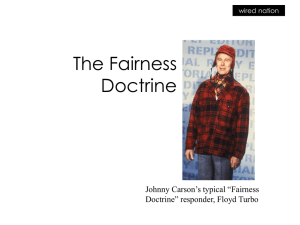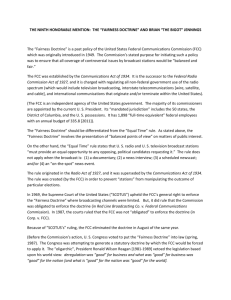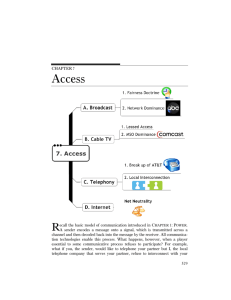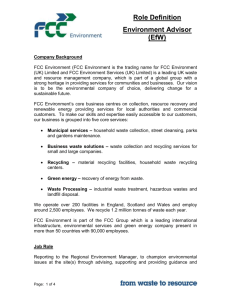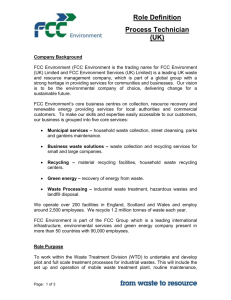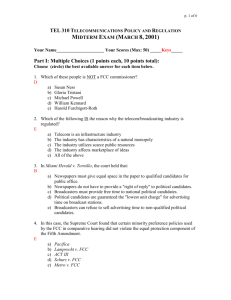TEL 310
advertisement
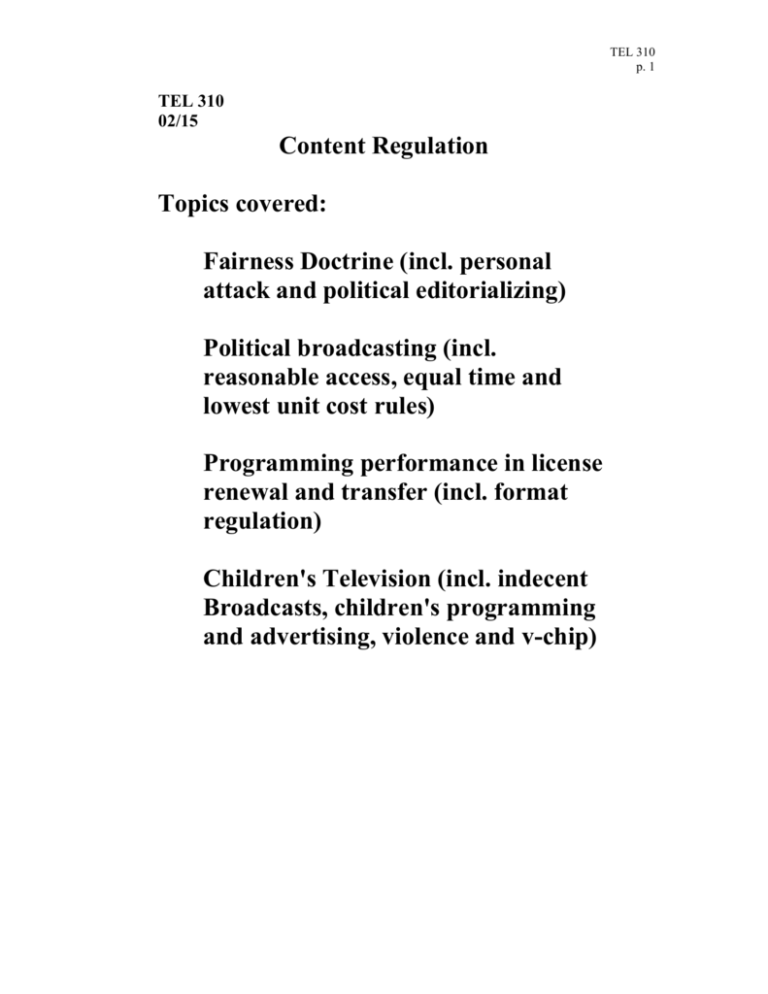
TEL 310 p. 1 TEL 310 02/15 Content Regulation Topics covered: Fairness Doctrine (incl. personal attack and political editorializing) Political broadcasting (incl. reasonable access, equal time and lowest unit cost rules) Programming performance in license renewal and transfer (incl. format regulation) Children's Television (incl. indecent Broadcasts, children's programming and advertising, violence and v-chip) TEL 310 p. 2 Introduction The First Amendment of the U.S. Constitution: Congress shall make no law…abridging the freedom of speech, or of the press… 47 U.S.C. 326: Nothing in this chapter shall be understood or construed to give the Commission the power of censorship over the radio communications or signals transmitted by any radio station, and no regulation or condition shall be promulgated or fixed by the Commission which shall interfere with the right of free speech by means of radio communication. Broadcasters as "public trustees" What is public trustee? -- Duty to subordinate one's own interest to those of a wider public good. Why should broadcasters be regarded as public trustees? --- Free use of the spectrum, a public resource FCC not just supervising the traffic, but also determining the composition of that traffic TEL 310 p. 3 Fairness Doctrine 1. Rules Two parts of fairness doctrine: (p. 150) --- Need to provide coverage of important controversial issues --- Need to provide presentation of contrasting viewpoints on such issues Personal attack: (p. 151) --- Notification of the attack --- Offer of opportunity to respond to the attack Political editorializing: (p. 151) Same. 2. Legality of Fairness Doctrine: The print model v. the broadcast model Tornillo (U.S., 1974) Red Lion (U.S., 1969) TEL 310 p. 4 Miami Herald Publishing Co. v. Tornillo (1974) 1. Facts: --- The Herald ran two unflattering on Tornillo, a candidate for public office --- Tornillo demanded space in the paper to respond --- The paper refused and Tornillo sued under the Florida "right of reply" statute (p. 149) 2. Issue: Does the Florida statute violate the First Amendment? 3. Decision: Yes, the statute is unconstitutional. 4. Reasoning: --- Intrusion into the function of editors/Regulating content --- Chilling effect on political/electoral coverage "A responsible press is undoubtedly desirable goal, but press responsibility is not mandated by the Constitution and like many other virtues it cannot be legislated." (p. 149) * Not a fairness doctrine case TEL 310 p. 5 Red Lion Broadcasting Co. v. FCC (U.S., 1969) 1. Facts --- Rev. Billy James Hargis attacked Fred Cook and his book on WGCB --- Cook asked the radio station for time to rebut the attack --- The station refused and Cook complained to FCC --- FCC ruled against the station citing Fairness Doctrine --- Red Lion, owner of the station, sued FCC 2. Issue --- Does Fairness Doctrine violated the First Amendment? 3. Decision: No. 4. Reasoning: --- Differences in new media characteristics justify different First Amendment standards So, what is unique about broadcasting? "It does not violate the First Amendment to treat licensees given the privilege of using scare radio frequencies as proxies for the entire community, obligated to give suitable time and TEL 310 p. 6 attention to matters of great public concern." (p. 154) --- Right of viewers and listeners paramount 3. Elimination of Fairness Doctrine 1) 1985 FCC Fairness Doctrine Report (p. 156): It no longer served the public interest. How so? --- Fairness Doctrine, in operation, had opposite effect: Inhibited presentation of controversial issues --- It impairs the journalistic freedom of broadcasters --- No need for the doctrine in light of the increase of information sources * Note that the 1985 report did not eliminate the doctrine 2) FCC repealed Fairness Doctrine in 1987, but kept the "personal attack" and "political editorializing" components. 3) In Oct. 2000, the FCC, ordered by court order, repealed the above two components. TEL 310 p. 7 Equal Time Rules (p. 172) Simply put, if a station gives air time or sell political ad to a candidate for an elective office, it should do so to all legally qualified candidates running against the initial candidate. --- Exemptions for bona fide news events coverage (including presidential debate) Lowest Unit Cost Rules If a station sells political ads to candidates at all, it must sell them at the lowest unit charge for that class of air time. Reasonable Access Rules A station must sell political ads to candidates of federal offices, and do so at the lowest unit charge. TEL 310 p. 8 Programming Performance Historically, the FCC had imposed detailed regulations and guidelines on broadcasters' programming performance and evaluated their compliance with those regulations in license renewal and transfer proceedings. During the 1980s, the FCC removed many of the regulations. Example: In the 1984 "Television Deregulation" report (pp. 257-265), the FCC eliminated: Guidelines for local, news, and public affairs programming Instead, broadcasters obligated to provide issue-responsive programming Ascertainment requirements Guidelines for amount of Commercial time per hour Program log requirement Instead, a quarterly issues/programs list requirement Rationale for elimination: The marketplace does a better job in achieving the goals than the government rules TEL 310 p. 9 Another example: Format Regulation What is format regulation? (p. 231) --- Ordered by D.C. Cir. Court. --- Rationale: Program diversity The FCC decided not to regulate entertainment format (1976). Why? --- Marketplace is the best available means of producing program diversity --- Practical difficulty in regulating format --- Constitutional difficulty The Court disagreed with the FCC in WNCN Listeners Guild v. FCC (D.C.Cir., 1981). --- FCC is required to consider the public interest implications of format abandonment. TEL 310 p. 10 The SC reversed the lower court's decision in FCC v. WNCN Listeners' Guild (U.S., 1981). --- Diversity is not the only policy the Commission must consider --- The other: preserving journalistic discretion --- The FCC's judgment on how the public interest is better served should be entitled to substantial judicial deference. --- Red Lion does not imply that "the First Amendment grants individual listeners the right to have the Commission review the abandonment of their favorite entertainment programs" (p. 240). Homework #2 (Due Feb. 22): Conduct research on the Internet, and write, in one page or two, a brief historical account of the "fate" of the personal attack and political editorializing rules between 1987 when the FCC eliminated the Fairness Doctrine and 2000 when the above two rules were finally repealed.
